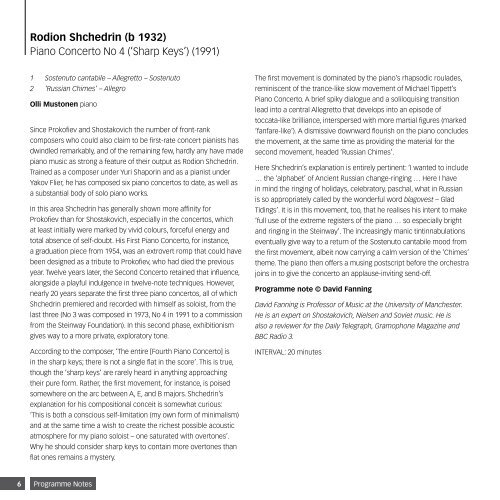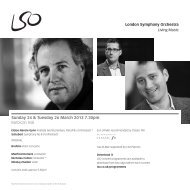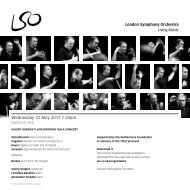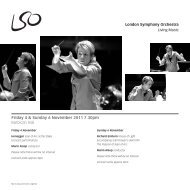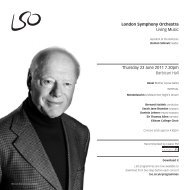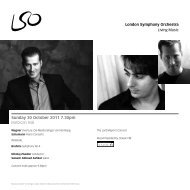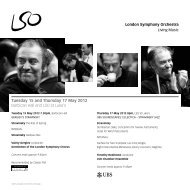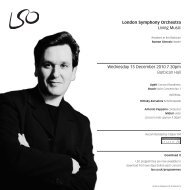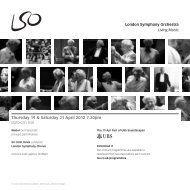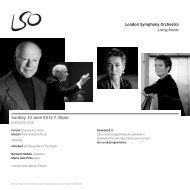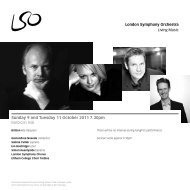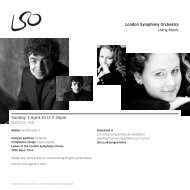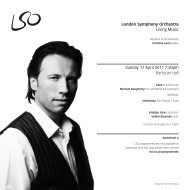19 November programme - London Symphony Orchestra
19 November programme - London Symphony Orchestra
19 November programme - London Symphony Orchestra
Create successful ePaper yourself
Turn your PDF publications into a flip-book with our unique Google optimized e-Paper software.
Rodion Shchedrin (b <strong>19</strong>32)<br />
Piano Concerto No 4 (‘Sharp Keys’) (<strong>19</strong>91)<br />
1 Sostenuto cantabile – Allegretto – Sostenuto<br />
2 ‘Russian Chimes’ – Allegro<br />
Olli Mustonen piano<br />
Since Prokofiev and Shostakovich the number of front-rank<br />
composers who could also claim to be first-rate concert pianists has<br />
dwindled remarkably, and of the remaining few, hardly any have made<br />
piano music as strong a feature of their output as Rodion Shchedrin.<br />
Trained as a composer under Yuri Shaporin and as a pianist under<br />
Yakov Flier, he has composed six piano concertos to date, as well as<br />
a substantial body of solo piano works.<br />
In this area Shchedrin has generally shown more affinity for<br />
Prokofiev than for Shostakovich, especially in the concertos, which<br />
at least initially were marked by vivid colours, forceful energy and<br />
total absence of self-doubt. His First Piano Concerto, for instance,<br />
a graduation piece from <strong>19</strong>54, was an extrovert romp that could have<br />
been designed as a tribute to Prokofiev, who had died the previous<br />
year. Twelve years later, the Second Concerto retained that influence,<br />
alongside a playful indulgence in twelve-note techniques. However,<br />
nearly 20 years separate the first three piano concertos, all of which<br />
Shchedrin premiered and recorded with himself as soloist, from the<br />
last three (No 3 was composed in <strong>19</strong>73, No 4 in <strong>19</strong>91 to a commission<br />
from the Steinway Foundation). In this second phase, exhibitionism<br />
gives way to a more private, exploratory tone.<br />
According to the composer, ‘The entire [Fourth Piano Concerto] is<br />
in the sharp keys; there is not a single flat in the score’. This is true,<br />
though the ‘sharp keys’ are rarely heard in anything approaching<br />
their pure form. Rather, the first movement, for instance, is poised<br />
somewhere on the arc between A, E, and B majors. Shchedrin’s<br />
explanation for his compositional conceit is somewhat curious:<br />
‘This is both a conscious self-limitation (my own form of minimalism)<br />
and at the same time a wish to create the richest possible acoustic<br />
atmosphere for my piano soloist – one saturated with overtones’.<br />
Why he should consider sharp keys to contain more overtones than<br />
flat ones remains a mystery.<br />
6 Programme Notes<br />
The first movement is dominated by the piano’s rhapsodic roulades,<br />
reminiscent of the trance-like slow movement of Michael Tippett’s<br />
Piano Concerto. A brief spiky dialogue and a soliloquising transition<br />
lead into a central Allegretto that develops into an episode of<br />
toccata-like brilliance, interspersed with more martial figures (marked<br />
‘fanfare-like’). A dismissive downward flourish on the piano concludes<br />
the movement, at the same time as providing the material for the<br />
second movement, headed ‘Russian Chimes’.<br />
Here Shchedrin’s explanation is entirely pertinent: ‘I wanted to include<br />
… the ‘alphabet’ of Ancient Russian change-ringing … Here I have<br />
in mind the ringing of holidays, celebratory, paschal, what in Russian<br />
is so appropriately called by the wonderful word blagovest – Glad<br />
Tidings’. It is in this movement, too, that he realises his intent to make<br />
‘full use of the extreme registers of the piano … so especially bright<br />
and ringing in the Steinway’. The increasingly manic tintinnabulations<br />
eventually give way to a return of the Sostenuto cantabile mood from<br />
the first movement, albeit now carrying a calm version of the ‘Chimes’<br />
theme. The piano then offers a musing postscript before the orchestra<br />
joins in to give the concerto an applause-inviting send-off.<br />
Programme note © David Fanning<br />
David Fanning is Professor of Music at the University of Manchester.<br />
He is an expert on Shostakovich, Nielsen and Soviet music. He is<br />
also a reviewer for the Daily Telegraph, Gramophone Magazine and<br />
BBC Radio 3.<br />
INTERVAL: 20 minutes<br />
Rodion Shchedrin (b <strong>19</strong>32)<br />
The Man<br />
The generation of Soviet composers after Shostakovich produced<br />
charismatic and exotic figures such as Galina Ustvolskaya,<br />
Alfred Schnittke and Sofiya Gubaydulina, whose music was initially<br />
controversial but then gained cult status. At the other end of the<br />
stylistic spectrum it featured highly gifted craftsmen such as<br />
Boris Tishchenko, Boris Tchaikovsky and Mieczysław Weinberg, all<br />
of whom worked more or less within the parameters laid down by<br />
Shostakovich and were highly respected in their heyday but gradually<br />
fell from favour.<br />
Somewhere in between we can locate Rodion Shchedrin – an<br />
individualist with a broader and more consistent appeal, who could<br />
turn himself chameleon-like to virtuoso pranks or to profound<br />
philosophical reflection, to Socialist Realist opera or to folkloristic<br />
Concertos for <strong>Orchestra</strong> (a particular speciality), to technically solid<br />
Preludes and Fugues, to jazz, and, when he chose, even to twelvenote<br />
constructivism.<br />
Trained at the Moscow Conservatoire in the <strong>19</strong>50s, as a composer<br />
under Yuri Shaporin and as a pianist under Yakov Flier in the early<br />
years of the Post-Stalinist Thaw, Shchedrin was one of<br />
the first to speak out against the constraints of<br />
musical life in the Soviet Union. He went on to play<br />
a significant administrative role in the country’s<br />
musical life, heading the Russian Union of Composers<br />
from <strong>19</strong>73 to <strong>19</strong>90. Married since <strong>19</strong>58 to the star<br />
Soviet ballerina Maya Plisetskaya, he established a<br />
significant power-base from which he was able to promote<br />
not only his own music but also that of others – such as<br />
Schnittke, whose notorious First <strong>Symphony</strong> received its<br />
sensational premiere only thanks to Shchedrin’s support.<br />
An unashamed eclectic, and suspicious of dogma from<br />
either the arch-modernist or arch-traditionalist wings of<br />
Soviet music, Shchedrin occupied a not always comfortable<br />
position, both in his pronouncements and in his creative<br />
work. With one foot in the national-traditional camp and the<br />
other in that of the internationalist-progressives, he was<br />
tagged with the unkind but not unfair label of the USSR’s<br />
Rodion Shchedrin © www.lebrecht.co.uk<br />
‘official modernist’. From <strong>19</strong>92 he established a second home in<br />
Munich, but he still enjoyed official favour in post-Soviet Russia,<br />
adding steadily to his already impressive roster of prizes.<br />
Shchedrin has summed up his artistic credo as follows: ‘I continue to<br />
be convinced that the decisive factor for each composition is intuition.<br />
As soon as composers relinquish their trust in this intuition and rely in<br />
its place on musical ‘religions’ such as serialism, aleatoric composition,<br />
minimalism or other methods, things become problematic.’<br />
Programme Notes<br />
7


